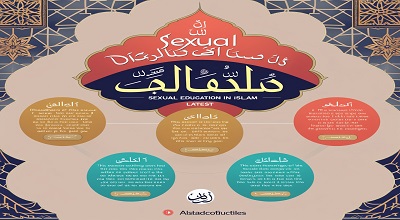Disadvantages of Sexual Education in Islam
Disadvantages of Sexual Education in Islam: Sexual education is a widely debated topic across cultures and religions. In Islam, discussions about sexuality are guided by religious principles that emphasize modesty, privacy, and adherence to Sharia law.
While some argue that sexual education is necessary for health and awareness. Others believe it contradicts Islamic teachings. This article explores the disadvantages of sex education in Islam, providing examples and perspectives from Islamic scholars.
Contradiction with Islamic Modesty (Haya)
Concept of Haya in Islam
Haya (modesty) is a fundamental Islamic value that encourages decency in behavior, speech, and dress. Islam promotes privacy regarding intimate matters, and open discussions about sexuality may conflict with this principle.
Examples of Violation
- Explicit Content in Schools: Western-style sexual education often includes detailed discussions on contraception, LGBTQ+ topics, and premarital relationships, which may be considered inappropriate in Islamic teachings.
- Mixed-Gender Classes: Co-ed sexual education classes can lead to unnecessary interactions between non-mahram (unrelated) men and women, which Islam discourages.
Promotion of Un-Islamic Practices
Encouraging Premarital Relationships
Sexual education programs sometimes normalize premarital sex by teaching safe sex practices rather than abstinence. In Islam, any sexual activity outside marriage is strictly prohibited (Zina).
Example: Condom Distribution in Schools
Some countries distribute condoms in schools as part of sexual health programs. This approach may indirectly encourage premarital sex, which contradicts Islamic rulings.
Exposure to LGBTQ+ Ideologies
Islamic Stance on Homosexuality
Islam prohibits homosexual acts, considering them sinful. Comprehensive sexual education often includes LGBTQ+ acceptance, which conflicts with Islamic beliefs.
Example: Western Curriculum Influence
In some Muslim-majority countries, Western-funded NGOs promote LGBTQ+ inclusive education, leading to cultural and religious clashes.
Undermining Parental Authority
Parents as Primary Educators
Islam places the responsibility of teaching children about morality and sexuality on parents. Formal sexual education may override parental guidance.
Example: Government-Mandated Programs
In some regions, governments enforce sexual education without parental consent, leading to conflicts with Islamic family values.
Misinterpretation and Misapplication of Islamic Teachings
Lack of Religious Context
Non-Islamic sexual education may present concepts like masturbation, birth control, and gender fluidity without Islamic perspectives, leading to confusion.
Example: Misleading Information on Contraception
While Islam permits contraception within marriage. Some programs promote it for unmarried individuals, which is against Islamic law.
Psychological and Moral Impact on Youth
Premature Exposure to Sexual Topics
Young children may not be emotionally ready for explicit discussions, leading to moral corruption or early sexualization.
Example: Early Introduction of Gender Identity
Some curricula introduce complex gender theories at a young age, which may conflict with Islamic teachings on fixed male and female genders.
Cultural and Religious Conflicts
Western vs. Islamic Values
Many sexual education programs are based on secular Western ideologies, which may not align with Islamic principles.
Example: Sex Education in Muslim-Minority Countries
Muslim students in Western schools may face pressure to conform to non-Islamic sexual norms, causing identity conflicts.
Alternative Islamic Approaches to Sexual Education
Islamic Sex Education at Home
Parents should teach children about puberty, marriage, and modesty in an Islamic framework.
Example: Islamic Books on Puberty
Books like “The Muslim Parent’s Guide to the Birds and the Bees” provide Sharia-compliant guidance.
Conclusion
While sexual education aims to promote health and awareness. Its Western model often conflicts with Islamic values. Muslims should seek alternative methods that align with Sharia, ensuring modesty, morality, and religious adherence.
FAQs
1. Is sexual education completely forbidden in Islam?
No, but it must be taught within Islamic guidelines, focusing on modesty and marriage.
2. How should Muslim parents approach sex education?
Parents should teach children gradually, using Islamic sources and avoiding explicit content.
3. Can schools teach sexual education in Muslim countries?
Yes, but it should be Islam-centered, avoiding un-Islamic concepts like LGBTQ+ promotion.
4. What is the Islamic view on contraception?
Contraception is permitted within marriage but not for premarital relationships.
5. How does Islam address puberty education?
Islam encourages teaching children about puberty respectfully and modestly, often through parental guidance.
Download Link: Blue Whale Casino APK
